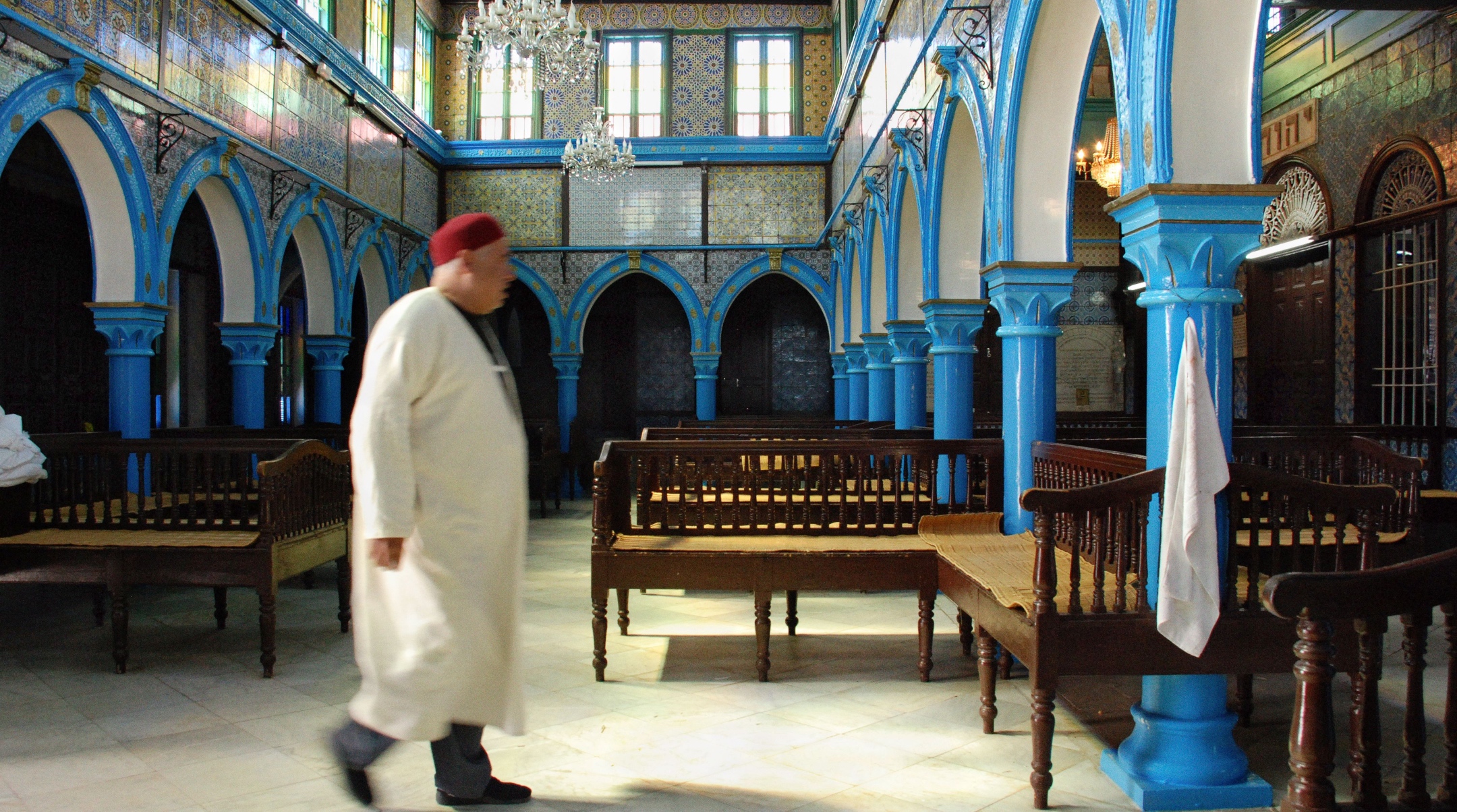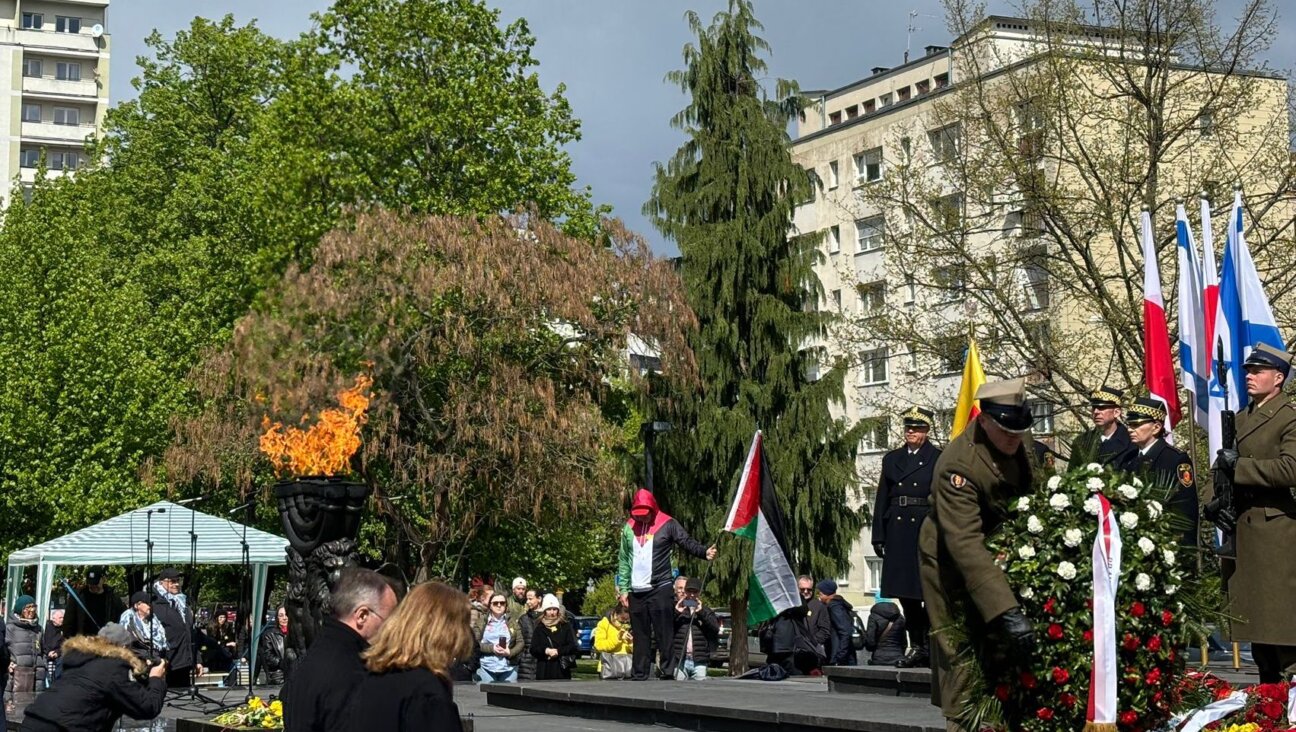‘Jewish life goes on’: Djerba Jews and their supporters show resilience after deadly attack

Interior of La Ghriba Synagogue, Djerba, Tunisia (Photo courtesy of Chrystie Sherman/Diarna Geo-Museum of North African & Middle Eastern Jewish Life)
(JTA) — The day after a gunman killed four people outside an ancient place of Jewish worship on the Tunisian island of Djerba, men gathered in the same synagogue not to mourn, but to celebrate.
They were there to witness the blessing of a new life: a brit milah, or ritual circumcision. Not long after, a recording of the ceremony, complete with the men chanting in Hebrew as they surrounded the eight-day-old baby, made its way to the phone of Isaac Choua, a Sephardic rabbi living in New York.
For Choua, watching the ceremony was a relief from the horrors that had emerged the day before, when a rogue security official at the Tunisian synagogue killed two Jewish cousins, Aviel Haddad, 30, and Benjamin Haddad, 43, as well as two security guards before being gunned down.
“Something beautiful happened,” said Choua, the Middle East and North Africa communities liaison for the World Jewish Congress, in an interview. “They had a brit milah in Djerba, even with all the chaos. Jewish life goes on.”
Tuesday’s deadly shooting came during the Hiloula, an annual pilgrimage and celebration of Jewish sages held on or around Lag b’Omer, which takes place a little more than a month after the beginning of Passover. The annual festivity attracts thousands of Jews from around the world, many of Tunisian descent. It is held at the El Ghriba synagogue — a 19th-century building constructed on a site believed to have been a Jewish house of worship for as long as 2,500 years.
The pilgrimage has grown substantially in recent years, after trepidation following an attack on the synagogue by Al-Qaeda in 2002 that killed 20 people, and a suspension of the pilgrimage in 2011 amid security concerns in the wake of the Arab Spring, which began in Tunisia.
The Tunisian government has invested in the pilgrimage, billing it as a symbol of the country’s tolerance, and has provided intense security. Last year, Tunisia was one of six African countries that signed the “Call of Rabat,” an initiative of the American Sephardi Federation that sought a commitment to preserving Jewish heritage on the continent.
Jason Guberman, the executive director of the American Sephardi Federation, said the numbers that the Hiloula attracts today have not yet reached the 10,000 or so who attended before the 2002 attack. The Arab Spring and COVID-19 pandemic, he said, “have also deterred pilgrims in the past decade.” He estimated that fewer than 5,000 people attend annually now.
Additionally, Tunisia’s authoritarian president Kais Saied remains unfriendly to Israel and has rebuffed efforts by successive American administrations to join the Abraham Accords, the normalization agreements between Israel and several Arab countries.
Djerba, nonetheless, remains an oasis of coexistence, said Yaniv Salama, the CEO of the Salamanca Foundation, which seeks to reinvigorate Jewish communities in Muslim lands.
”You have to understand something about Djerba,” Salama said. “The community there has very, very deep ties with the local municipalities. Everything is done in conjunction — there are joint [security] watches” between the Jewish and larger communities, “and joint communication between the Jewish community leaders and the local police.”
Jason Isaacson, the American Jewish Committee’s chief policy and political affairs officer, who has frequently visited Djerba, said it was significant that two Tunisian security officials died protecting the Jewish community.
“It’s obviously now going to be a source of shame for the country that this happened, within its own military forces, but this happens within military forces” everywhere, he said. “The fact that the country deploys a huge protective cordon around the synagogue and around the festivities and around the worshipers who come, to assure that it all goes off smoothly and proper in a celebratory spirit, is significant.”
Aaron Zelin, a senior fellow at the Washington Institute for Near East Policy think tank whose expertise is Islamist extremism in Tunisia, said the attack appeared to be an outlier, unlike the carefully planned 2002 attack.
“It wasn’t really a sophisticated attack,” Zelin said. “So it’s plausible it could have just been one person that just decided to do something on their own accord, and there wasn’t some broader plot or planning in the same way.”
Choua said the Tunisian Jewish Diaspora would not be deterred. “Jewish Tunisians are still going to either visit family [or] visit this pilgrimage site,” he said. “Jews are resilient.”
Djerba has the attention of the world, at least for the moment. The day before the attack Deborah Lipstadt, the U.S. envoy monitoring antisemitism, alongside U.S. ambassador to Tunisia Joey Hood, joined Tunisian officials in a ceremony launching the Hiloula.
“I am sickened and heartbroken by the lethal, antisemitic attack targeting the Ghriba synagogue in Djerba during the Lag B’Omer celebrations, with thousands of Jewish pilgrims in attendance,” Lipstadt said on Twitter.
That may be the silver lining, the World Jewish Congress’s Choua said: The predominantly Ashkenazi Jewish Diaspora tends to forget the communities that persist outside the Western world.
“The Jewish world is noticing that there’s still Jews in the Middle East and North Africa,” he said. “This might even spark more tourism in the country itself.”
Salama said he did not expect the community of about 1,400 people, which includes a number of institutes of religious learning, to be broken following the attack.
“They’re all they’ll do their grieving and they’ll continue, they’ll push forward,” he said. “They really have got a stiff upper lip.”
Robert Ejnes, the executive director of CRIF, the umbrella body for French Jewry, said the French Jewish community is close to the Tunisian Jewish community because France colonized the country beginning in the 1800s, and because the community speaks French. He said that the Hiloula attracts French Jews of all ethnic origins.
“It’s really affecting the whole of the community of France because on the Hiloula, there are a lot of people going [from] the French Jewish community of all origins,” he said.
Ejnes found it notable that even after the attack, French Jews who attended the Hiloula posted photos of the festivities on social media. He said he expected the same number of people to attend next year’s Hiloula.
“People will be resilient,” he said. “They posted pictures of them[selves] at the Ghriba, saying, ‘We’ll be back.’”
This article originally appeared on JTA.org.

I hope you appreciated this article. Before you go, I’d like to ask you to please support the Forward’s award-winning journalism this Passover.
In this age of misinformation, our work is needed like never before. We report on the news that matters most to American Jews, driven by truth, not ideology.
At a time when newsrooms are closing or cutting back, the Forward has removed its paywall. That means for the first time in our 126-year history, Forward journalism is free to everyone, everywhere. With an ongoing war, rising antisemitism, and a flood of disinformation that may affect the upcoming election, we believe that free and open access to Jewish journalism is imperative.
Readers like you make it all possible. Right now, we’re in the middle of our Passover Pledge Drive and we still need 300 people to step up and make a gift to sustain our trustworthy, independent journalism.
Make a gift of any size and become a Forward member today. You’ll support our mission to tell the American Jewish story fully and fairly.
— Rachel Fishman Feddersen, Publisher and CEO
Join our mission to tell the Jewish story fully and fairly.
Only 300 more gifts needed by April 30






















